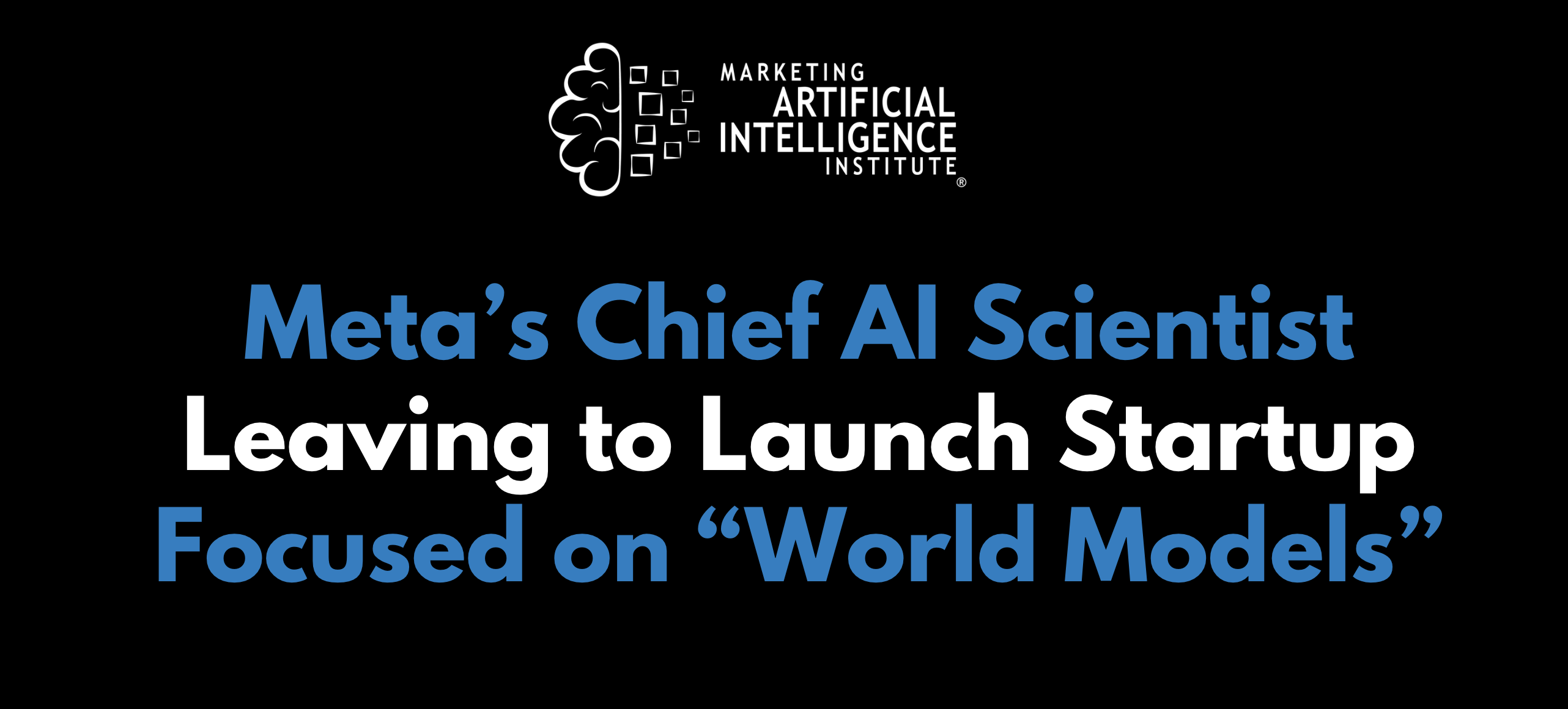Yann LeCun, Meta’s Chief AI Scientist and one of the "godfathers" of modern AI, is planning to leave the company to launch a startup.
The move was reported last week, but LeCun posted on Facebook confirming it for the first time this week. He wrote, in part,
"I am creating a startup company to continue the Advanced Machine Intelligence research program (AMI) I have been pursuing over the last several years with colleagues at FAIR, at NYU, and beyond.
The goal of the startup is to bring about the next big revolution in AI: systems that understand the physical world, have persistent memory, can reason, and can plan complex action sequences."
The move represents a fundamental split over where artificial intelligence is headed: continued heavy reliance on current large language models (LLMs) or on what LeCun calls these “world models”.
It will pit LeCun’s long-term vision against the entire industry’s high-stakes bet on LLMs.
For insight into what’s happening with this, I talked with Marketing AI Institute and SmarterX founder and CEO Paul Roetzer on Episode 180 of The Artificial Intelligence Show.
A Fundamental Disagreement on AI
For years, LeCun has argued that large language models at the center of Meta's, and essentially the entire AI industry's, strategy are a distraction. He’s been vocal that these models, which are trained on large amounts of text, cannot reason, plan, or understand the world like humans. He wants to create models based on how a baby learns from the environment around her.
Roetzer recounted what LeCun said at a recent symposium at MIT: “I've not been making friends in various corners of Silicon Valley, including at Meta, [by] saying that within three to five years, world models, not language models will be the dominant model for AI architectures, and nobody in their right mind would use large language models of the type that we have today.”
Recently, Meta CEO Mark Zuckerberg pivoted his company away from the long-term, foundational research that LeCun’s lab (FAIR) has pursued since 2013. Instead, he reorganized under Superintelligence Labs led by new hire Alexandr Wang, former CEO of Scale AI.
These efforts are prioritizing the rapid development of AI products to compete directly with OpenAI and Google.
LeCun, a Turing Award winner, believes this entire approach is a dead end.
The New “World Model”
LeCun's new venture will focus on models designed to learn from video and spatial data, much like a human or animal learns by observing and interacting with its environment.
Roetzer explains a world model is an "AI's internal mental model of how the world works and behaves. So sort of think of it as inside the machine simulation of the world."
This internal model would allow an AI to predict outcomes based on an understanding of cause and effect. For example, “If I drop this glass, it will break."
A Shakeup Years in the Making
LeCun's departure seemed all but inevitable following the large strategic and organizational shakeup at Meta.
Zuckerberg has been pouring billions into a new "super intelligence" push and hiring Wang, the 28-year-old founder of Scale AI, to lead the new division. In the new structure, LeCun, one of the world's most celebrated computer scientists, would report to Wang.
The move signaled a clear shift away from LeCun’s research-first philosophy. In his Facebook post, he thanked Zuckerberg and other colleagues and said Meta will be a partner in his new company.
High-Stakes Competition
The move sets the stage for a major showdown. The AI industry is spending hundreds of billions of dollars on an LLM-centric future, while one of its founding architects is now starting a new company to prove them all wrong.
LeCun’s track record is hard to ignore.
“He has been proven right time and time again when people doubted him,” Roetzer says. “The question is: ‘Is he going to be right this time?’”
Mike Kaput
Mike Kaput is the Chief Content Officer at SmarterX and a leading voice on the application of AI in business. He is the co-author of Marketing Artificial Intelligence and co-host of The Artificial Intelligence Show podcast.


